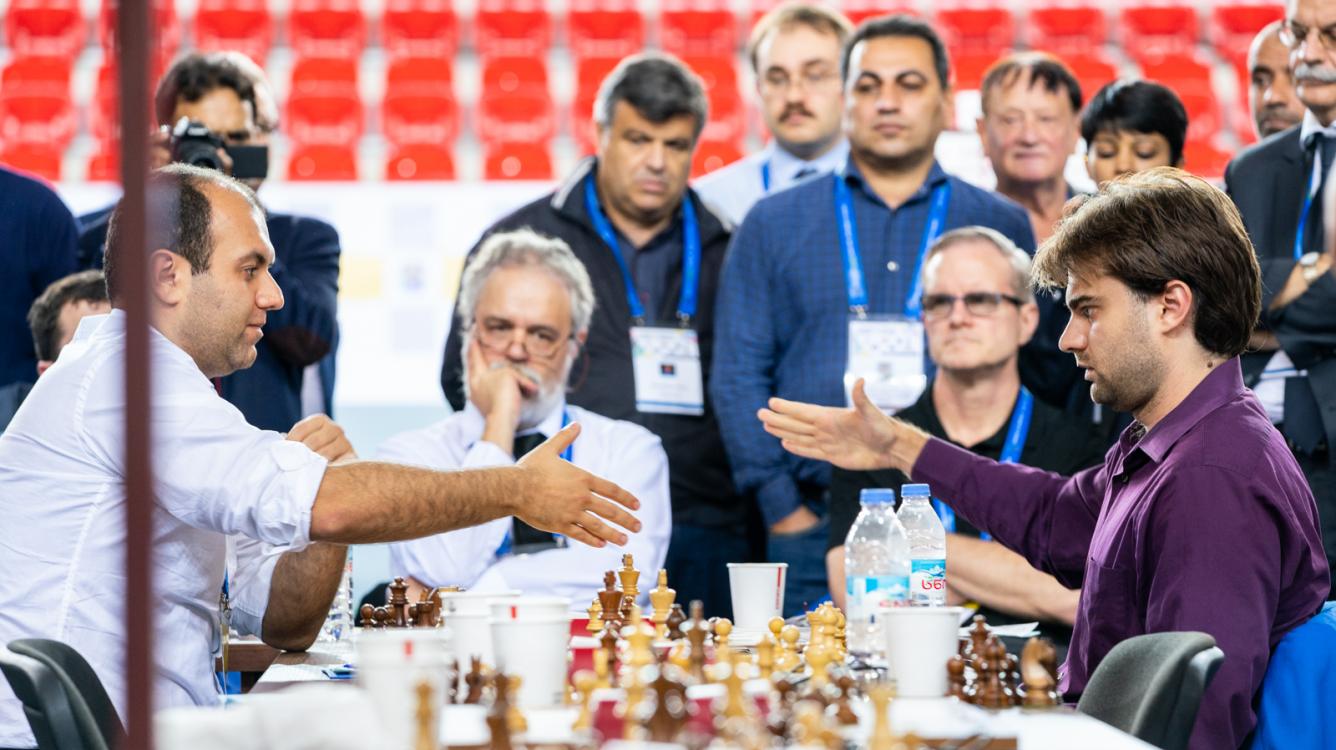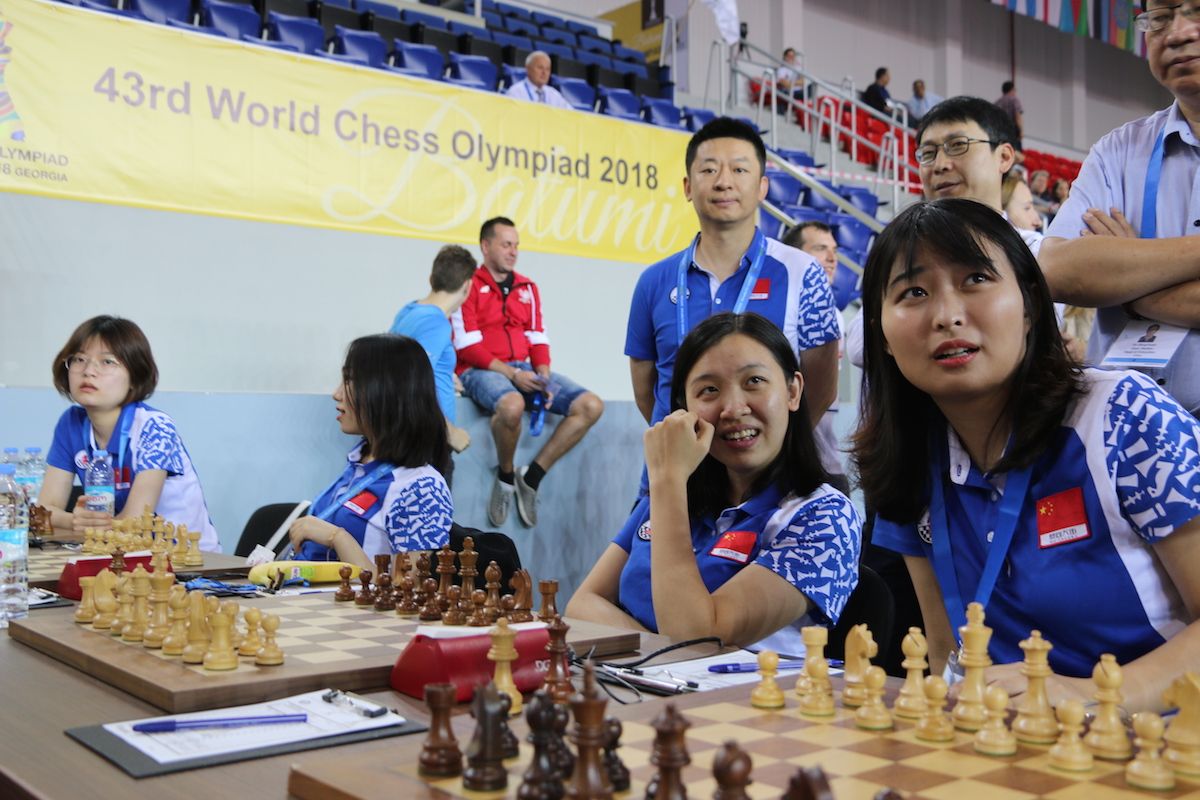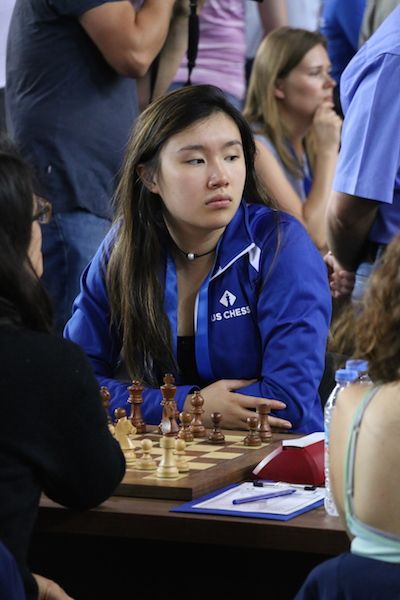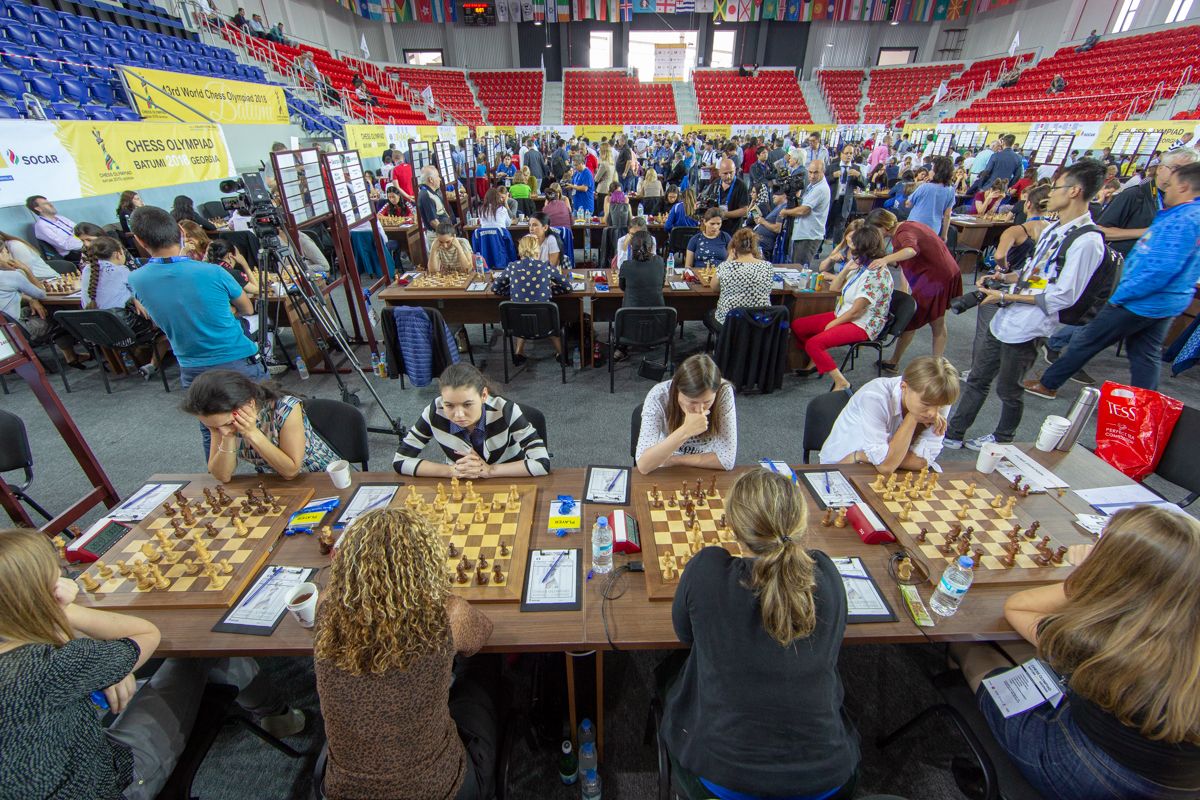
Chess Olympiad: U.S. Grabs Sole Lead In Round 8
The situation was tricky, but eventually the U.S. pulled through and beat Azerbaijan to grab the sole lead at the 2018 Chess Olympiad in Batumi. China and Ukraine are leading the women's tournament.
More photographers and videographers than ever had squeezed themselves behind the chairs of the arbiter and the two team captains to get their shots of one of the key matchups of this Olympiad. Two of the three leaders, the U.S. and Azerbaijan, faced each other, while right next to them co-leader Poland played Armenia.

U.S.-Azerbaijan, the center of attention at the start of the round. | Photo: Peter Doggers/Chess.com.
Team USA is the top seed, and of course the defending champion. For Azerbaijan the same, surprising statistic holds as for Armenia in the women’s tournament: not a single medal won yet at an Olympiad.
The match developed along a classic film script, where the winner of the fight initially gets punched severely (Radjabov-So 1-0), tumbles and struggles to get on his feet again (Nakamura-Naiditsch 1/2), but eventually finds renewed energy (Caruana-Mamedyarov 1-0) and then delivers the knockout (Mamedov-Shankland 0-1).
Wesley So was sitting on a fantastic, undefeated 6/7 score, but today the fun ended. Teimour Radjabov played an excellent game from start (good prep) to finish (good technique), as in his best days. Because he plays so little, it's easy to forget how good Radjabov is when in top shape.

Radjabov, in good spirits before the game... | Photo: Maria Emelianova/Chess.com.

...and becoming to first to beat So. | Photo: Maria Emelianova/Chess.com.
Hikaru Nakamura's draw was his sixth in the tournament, after an easy win in the first round. Although the other two boards were better, it wasn't clear yet if they would win. A 2-2, or even a loss, was definitely possible.
"At some point I felt this match was going out of our hands," said Fabiano Caruana—but then the evaluation in his own game started to improve, step by step. The American number-one was squeezing water from stone like a certain Norwegian player (Magnus Carlsen) tends to do, and eventually managed to win, probably missing more than one quicker win along the way.

Rustam Kasimdzhanov, Tatev Abrahamyan, Fabiano Caruana and Maurice Ashley chatting before their matches. | Photo: Maria Emelianova/Chess.com.
"I was taking it move by move. I was trying to see what his options were after each of my moves and if it was immediately simplifying or if there is any obvious defense, and of course you have to do these things partly by intuition as well," said Caruana.
As a Magnus Carlsen fan, it's slightly alarming to see Fabiano Caruana's wins getting increasingly Carlsenesque in style. That being said, the Norwegian remains a Thanos in a world of capable avengers.
— Olimpiu G. Urcan (@olimpiuurcan) October 2, 2018
Chess.com's interview with Caruana, who also comments on the fact that he is now 4.5 points away from taking over the world number-one position from Magnus Carlsen.
Sam Shankland turned 27 on Monday, but didn't celebrate too much. The next day it became clear that was a good move, because he ended up playing 96 moves!
USA's board-four dominated the game from the early middlegame, and got a textbook advantage of pressure along an open file upon a backward pawn for Rauf Mamedov.
Shankland happens to have written his own textbook recently, about pawn play, and it was typical that he converted the point with a number of pawn breaks.

A big win when it counts for Shankland... | Photo: Maria Emelianova/Chess.com.

...who was visibly relieved and happy. | Photo: Maria Emelianova/Chess.com.
In the same row in the center of the playing hall, Poland played yet another excellent match, holding Armenia to four draws. The spotlight again went to Jan-Krzysztof Duda, who found a truly brilliant drawing combination with Levon Aronian.
Chess.com's interview with Duda.
If anyone could win this match, it was in fact Poland. Kamil Dragun was a pawn up for a long time against Robert Hovhannisyan, but eventually had to accept the draw in a basic king-and-pawn ending.

Again playing very well, Dragun got close to a win. | Photo: Maria Emelianova/Chess.com.
Poland is now in clear second place, one point behind the U.S. Seven countries are right behind: Azerbaijan, India, France, China, Armenia, Germany and England.
The Indians defeated Czech Republic with three draws, and a win for Krishnan Sasikiran on board four. It seemed that Jiri Stocek ran out of ideas at some point and then, he made an odd move 32, while thinking for more than four minutes there.

Winner on board four, Krishnan Sasikiran. | Photo: Maria Emelianova/Chess.com.
Israel-England, Ukraine-France, China-Netherlands and Spain-Germany all saw the same scenario of three draws and one decisive game. In the latter match, Daniel Fridman decided the fight as Black. Josep Lopez was doing well initially, but the tables turned.
In Israel-England, it was Luke McShane who was congratulated for bringing home the two match points. After a strong exchange sacrifice, Maxim Rodshtein did well to give back material right away. The rook ending was probably a draw, but not when Rodshtein missed the best defense.

"Brilliant save by Mickey, ball goes upfield to Luke, who sticks it in the back of net! Goooaaaalll! Engerland! Engerland!..." #BatumiChess2018 #IAGOCOT
— John Saunders (@johnchess) October 2, 2018
Etienne Bacrot was the match winner in Ukraine-France after he had been outplayed earlier in the game. In the time trouble phase, Yuriy Kryvoruchko failed to find the (difficult!) winning line, and then also blundered an important pawn.

Bacrot signing the score sheet, next to Laurent Fressinet. | Photo: Maria Emelianova/Chess.com.
The last team on 13 points not mentioned yet is China, who defeated Netherlands thanks to Bu Xiangzhi's win vs Loek van Wely, whose Schlechter System with an early ...Ne4 didn't work today as the Chinese GM played power move after power move.

A powerful game by Bu Xiangzhi today. | Photo: Maria Emelianova/Chess.com.
| Rk. | SNo | Flag | Team | - | TB1 | TB2 | TB3 | TB4 |
| 1 | 1 | USA | 0 | 15 | 227,0 | 23,0 | 79 | |
| 2 | 11 | Poland | 0 | 14 | 209,5 | 22,5 | 81 | |
| 3 | 4 | Azerbaijan | 1 | 13 | 236,0 | 22,5 | 89 | |
| 4 | 5 | India | 1 | 13 | 203,0 | 22,5 | 78 | |
| 5 | 7 | France | 1 | 13 | 195,5 | 22,5 | 78 | |
| 6 | 3 | China | 1 | 13 | 193,0 | 21,0 | 75 | |
| 7 | 8 | Armenia | 1 | 13 | 191,5 | 21,5 | 77 | |
| 8 | 16 | Germany | 0 | 13 | 182,5 | 21,0 | 76 | |
| 9 | 9 | England | 1 | 13 | 175,0 | 19,5 | 77 | |
| 10 | 38 | Norway | 1 | 12 | 180,5 | 23,0 | 69 | |
| 11 | 2 | Russia | 1 | 12 | 178,0 | 21,0 | 76 | |
| 12 | 18 | Croatia | 2 | 12 | 167,5 | 20,5 | 77 | |
| 13 | 30 | Moldova | 1 | 12 | 160,5 | 19,5 | 72 | |
| 14 | 34 | Italy | 2 | 12 | 156,5 | 20,5 | 71 | |
| 15 | 35 | Austria | 2 | 12 | 151,0 | 20,5 | 67 | |
| 16 | 10 | Israel | 1 | 11 | 194,0 | 21,5 | 81 | |
| 17 | 24 | Spain | 2 | 11 | 189,0 | 22,0 | 76 | |
| 18 | 27 | Vietnam | 1 | 11 | 188,0 | 21,5 | 72 | |
| 19 | 6 | Ukraine | 2 | 11 | 179,0 | 18,5 | 81 | |
| 20 | 13 | Netherlands | 2 | 11 | 178,0 | 22,5 | 75 |
Top pairings: Poland-U.S., Azerbaijan-China, India-Armenia, Germany-France, England-Norway, Italy-Russia.
In the women's event, some truly crushing attacks cascaded down from the very top match to other contending teams.
Armenia's lead on the field proved to be short-lived as it went down without much of a fight against Ukraine. The host nation's border country stays on 13 match points while Ukraine leapfrogs to 14 points. It is joined by fellow round winners China, who dispatched Romania.

Ukraine-Armenia on board one. | Photo: Mike Klein/Chess.com.
No other teams have reached 14 points, but since China and Ukraine already played in round six, both will have to try to win gold by outscoring other nations.
After only 30 minutes, Ukrainian third board and former women's world champion GM Anna Ushenina was already nearly +9 against WFM Anna Sargsyan.

GM Anna Ushenina (right) next to teammate GM Natalia Zhukova. | Photo: Maria Emelianova/Chess.com.
The lesson was common but instructive: Don't allow the pawn sac on e6 if White can pile up in a hurry on that same square.
That lesson created an early deficit for Armenia that it could not dig out of from under.
From there GM Anna Muzychuk added a win of her own, and with two other draws, Ukraine took the match 3-1 and the overall classification, too.
China's effort to keep pace with Ukraine came from one of its own past national champions. GM Lie Tingjie played a well-known pawn sac against the French, only to get it back short thereafter with a cruncher:
Two other Chinese women won, including the current women's world champion, GM Ju Wenjun. The final score was thus 3.5-0.5.

Something has caught the eyes of the Chinese women's team before the start of the round. | Photo: Mike Klein/Chess.com.
Team USA got back on track one day after losing the lead for the first time all week. It won over Italy with two wins and two draws, and could have made it even more except for FM Jennifer Yu making some of her first endgame inaccuracies of the event. Still, it hardly mattered, as she still secured the draw and the match was never really in doubt.
Importantly for the U.S., the team got a win on board three. Previous to today, it had scored a miserable 1.5/7 there, which just shows how dominant its other players have been!
As was the case with the other women's games in this report so far, WGM Tatev Abrahamyan delivered a winning bolt very early in the battle.

WGM Tatev Abrahamyan conducted one of the easiest attacks of her career. | Photo: Mike Klein/Chess.com.
There was an unintended level of sneakiness that "provoked" Black's error.
So what did the 16-year-old Yu miss? A weird deflection move that would have offered an easy rook-and-pawn ending, and then another idea for a winning bishop ending.

FM Jennifer Yu might be adding higher titles before her name before long. Her six wins and two draws have her at a 2529 performance rating. Not best on the team though. GM Irina Krush needs no norms for anything but her 6.5/7 is a 2741 TPR! | Photo: Mike Klein/Chess.com.
You might as well make all of your mistakes in a game that didn't affect the match outcome:
The biggest upset of the big-name teams came when India, which outrated Hungary on all four boards, went down 3-1 without notching any wins. Maybe it was the presence of all three Polgar sisters together, the last two days, that inspired the Hungarians!

The Indian women's team, where the ladies on the two ends (GM Humpy Koneru, left, and IM Tania Sachdev) both lost today. | Photo: Mike Klein/Chess.com.
Especially useful is knocking off the women's world number-three on the top board. That's what happened when GM Thanh Trang Hoang took out GM Humpy Koneru. It didn't hurt Hoang to learn the game at the age of four, about the age when the Polgar sisters were being molded into champions as well!
Georgia had two teams in the top 10 going into the round but its dream of being the first nation to have two teams medal in the same Women's Olympiad all but ended today. Georgia two lost to Azerbaijan 2.5-1.5. Georgia's top team, despite having a 2-0 lead in number of GMs, lost 3-1 to Kazakhstan.

A painful loss for Georgia today. | Photo: Peter Doggers/Chess.com.
Kazakhstan was buoyed by a 150-point upset on the final board when WIM Gulmira Dauletova corralled some pawns and pushed her own.
One team is quite surprisingly getting buried in reports and standings: top-seeded Russia. After dropping two matches early on, The Russians are trying to claw their way back into the medal hunt. Today the team reminded everyone of its immense talent by beating Netherlands 4-0.
In 2016 it finished just outside the medals in fourth place, but the math seems to suggest that it may still have a small path to the podium, even if gold is a now an extreme long shot.

Russia was far too strong for the Netherlands today. | Photo: Peter Doggers/Chess.com.
Here are two nice moments from Russia's top two players. Fitting the theme of the round, both games lasted under 30 moves.
First, the finish from Chess.com video author GM Alexandra Kosteniuk, where her queen kept taking things and retracting, taking and retracting:
Then, young GM Aleksandra Goryachkina, who used basically the same idea as Ushenina, with similar results.
In tomorrow's round-9 pairings, as mentioned, 14-pointers China and Ukraine can't play each other again. So on top board, Kazakhstan (13 points) and its young star IM Dinara Saduakassova gets defending champion China, while Ukraine drops down to board two to face Azerbaijan (13 points).
Also with 13 points, the U.S. plays Hungary and Armenia plays Iran (12 points).
Russia's comeback must go through Romania. They both have 12 match points along with Mongolia and Georgia one, who also face off.
Batumi Olympiad (Women) | Round 8 Standings (Top 20)
| Rk. | SNo | Flag | Team | - | TB1 | TB2 | TB3 | TB4 |
| 1 | 3 | China | 0 | 14 | 227,5 | 23,5 | 81 | |
| 2 | 2 | Ukraine | 0 | 14 | 226,0 | 23,0 | 84 | |
| 3 | 10 | USA | 1 | 13 | 203,5 | 22,0 | 80 | |
| 4 | 13 | Hungary | 1 | 13 | 198,5 | 22,5 | 75 | |
| 5 | 11 | Azerbaijan | 1 | 13 | 196,0 | 22,5 | 73 | |
| 6 | 12 | Armenia | 1 | 13 | 193,0 | 21,0 | 81 | |
| 7 | 8 | Kazakhstan | 0 | 13 | 192,5 | 23,0 | 71 | |
| 8 | 1 | Russia | 2 | 12 | 205,5 | 23,5 | 73 | |
| 9 | 4 | Georgia 1 | 1 | 12 | 191,0 | 20,0 | 81 | |
| 10 | 28 | Iran | 2 | 12 | 185,5 | 22,0 | 76 | |
| 11 | 17 | Mongolia | 2 | 12 | 181,0 | 21,5 | 73 | |
| 12 | 20 | Romania | 2 | 12 | 159,5 | 20,0 | 75 | |
| 13 | 14 | Georgia 2 | 2 | 11 | 189,0 | 21,5 | 78 | |
| 14 | 5 | India | 1 | 11 | 185,5 | 21,5 | 78 | |
| 15 | 18 | Italy | 2 | 11 | 177,5 | 20,0 | 79 | |
| 16 | 31 | Uzbekistan | 2 | 11 | 170,0 | 20,0 | 78 | |
| 17 | 19 | Vietnam | 2 | 11 | 169,0 | 23,0 | 68 | |
| 18 | 15 | Spain | 2 | 11 | 164,0 | 21,0 | 68 | |
| 19 | 40 | Canada | 2 | 11 | 161,0 | 21,0 | 68 | |
| 20 | 26 | Czech Republic | 2 | 11 | 157,0 | 21,5 | 67 |
(Full standings here.)
Top pairings: Kazakhstan-China, Azerbaijan-Ukraine, U.S.-Hungary, Armenia-Iran, Russia-Romania.
Games via TWIC.
Mike Klein contributed to this report.
Earlier reports:
- Chess Olympiad Lineups Announced; Russian Streak Ends
- Chess Olympiad Starts With Spectacular Ceremony
- Chess Olympiad: 7 Minutes Of Tension In 1st Round
- Chess Olympiad Sparked By Marriage Proposal On Day 2
- Chess Olympiad: Wesley So Paces Team USA
- Chess Olympiad: Poland Beats Russia, Kramnik Gets Checkmated
- Chess Olympiad: Czechia Beats China, Poland Rolls On In Round 5
- Chess Olympiad: Azerbaijan, Poland Still Perfect
- Chess Olympiad: U.S. Joins Poland, Azerbaijan In Lead


